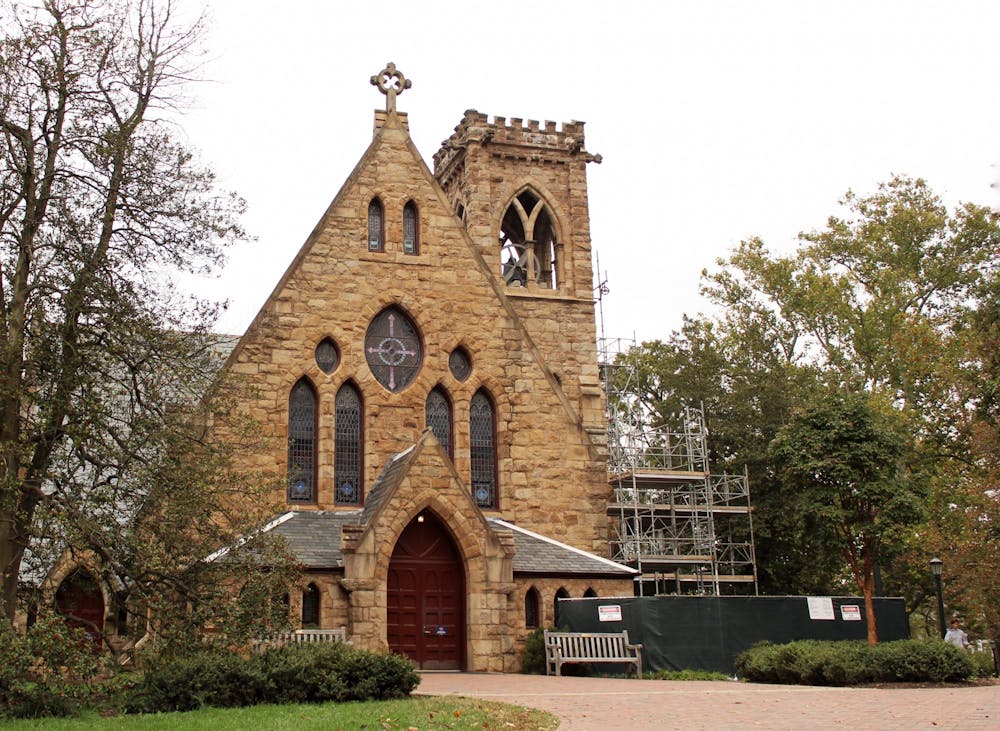Though religious gatherings — along with NCAA and intramural sporting events and expressive activities, such as protests and demonstrations — are technically exempt from the University’s 10 person gathering restriction, religious CIOs at U.Va. have still chosen to dramatically change their social and spiritual events to maintain the safety of their members.
The size limit on gatherings was originally five people, but the University raised it to 10 indefinitely as of Oct. 13.
Despite the exemption, which is a part of the University’s official policy on public health and safety, religious organizations are still required to adhere to any local, state and federal restrictions on gathering size — and to follow mask-wearing and social-distancing guidelines.
Charlottesville’s 50-person gathering limit does not apply to religious gatherings. While the Commonwealth of Virginia currently permits gatherings of up to 250 people, religious gatherings are exempt to this rule — however, attendees must practice social distancing and masking, among other rules.
Sujal Sigdel, a fourth-year Kinesiology student and president of Hindu Students Council, said that in a normal year, HSC would be focused on organizing big events like its annual Garba Night, an event where students dress up, enjoy traditional food and dance. However, due to the pandemic, events have shifted from large social gatherings to smaller spiritual gatherings over Zoom.
“We wanted to reach out and be closer with our members,” Sigdel said. “We thought it would be a good idea to have [a] virtual meeting going biweekly, reading one sacred book.”
Seek His Face, an organization that works to unite Christian groups across Grounds, normally focuses on bringing together 200 to 300 people through a worship gathering each semester. Matthew Houff, a class of 2020 alumnus and president of Seek His Face, said that the organization has decided to step back this semester due to its traditional role in facilitating large events, and instead has decided to focus on allowing other Christian groups to facilitate creating small-scale Christian communities.
“We decided that for our club, our group, we'd be better to actually just maybe back off this semester and let those other fellowships just do what they're doing,” Houff said. “They do the small-scale community really well.”
Chi Alpha, one of the Christian CIOs that has traditionally organized smaller gatherings as well as larger events, has canceled its large events and is holding its weekly Monday Night Live gathering over a livestream. Its Core Groups — small Bible study groups that meet weekly — have been limited to 15 people maximum and are meeting either socially distanced outside or over Zoom.
Matt Gillam, a fourth-year Batten student and chair of the Hillel Jewish Leadership Council, said that his organization has also chosen to conduct most spiritual events over Zoom.
“We do practically all of our services and all of our fellowships and things like that, where we would be spiritual or religious, all of that is over Zoom,” Gillam said.
HJLC has facilitated small socially distanced meet-ups between members, but is encouraging members to follow the University-wide regulations.
“We’re certainly mandating everybody follow all the regulations,” Gillam said. “We're trying to balance that, and then we have a lot of one-on-one programs where folks will meet one on one in person, safe distance, etc, etc.”
One of these programs is a mentorship program, through which about 20 upperclassmen have been meeting up one-on-one with younger members for coffee dates and other socially-distanced outings.
Saqib Rizvi, fourth-year engineering student and president of the Muslim Students Association, spoke with The Cavalier Daily about how MSA has been organizing its two weekly events, smaller Quran studies groups and larger student-led discussions on religious topics.
“This year, we made them online, just because like we really didn't want to do any in person events,” Rizvi said. “Because we didn't want our programs to lead to any increases [in COVID-19 cases].”
One challenge that many of the religious CIOs are facing is connecting with potential new members virtually — the Student Council’s annual Fall Fair, which is traditionally the main way CIOs connect with potential members, was held virtually this semester.
Houff said that one of the focuses of Seek His Face this year, in the absence of organizing its usual worship gatherings, is keeping the club strong through the restrictions of COVID-19 by recruiting new members.
“We're just trying to find underclassmen, so that way, even if this is kind of a dud year … at least we can have some enthusiastic, younger students who in future years can keep it going after I'm gone,” Houff said.
Organizations that are still holding discussions over Zoom have also run into some difficulties with the virtual format, including MSA.
“Turnout is a little lower than normal,” Sigdel said. “And it's harder to have those discussions in a similar manner as you would if they were in person.”
Despite the difficulties, there have been a few positive changes as a result of the shift online. Sigdel said that the HSC has had more opportunities to partner with similar groups at other colleges, now that everyone is spending more time on Zoom.
“That's definitely more possible, since we can't do anything in person,” Sigdel said.
Rizvi also said that it has been much easier to organize speakers for meetings, as there is no need to cover transportation and housing costs when speakers can just call in over Zoom.
For a safe community-building activity, Rizvi added that MSA organized a socially-distanced scavenger hunt to get first-years and returning members involved.
“If we're not doing anything in-person, it's really hard to engage the first-year class,” Rizvi said. “We made [the groups] so that they couldn't be larger than three people at a time, so people could interact with each other, but at the same time, it wouldn't be like, we're telling people to come to one place.”







